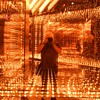Posted 1 year ago
 rniederman
rniederman
(346 items)
I’m sure everyone has a story about a great collectable that got away. The stories are pretty much the same. Either you underestimated the item and regretfully ignored it; the negotiation didn’t go your way; or it was simply bad timing. I’ve had my share of lost opportunities but one stands head-and-shoulders above all. Going through my PC, I recently found pictures of the camera and recollected the “almost” acquisition.
Here is my story.
Back in 1999 an absolutely amazing camera slipped through my fingers. Not just any photographic apparatus but an American camera with 36-lenses! That’s unheard of, but it’s real. I’ve seen 9 and 12 lens American cameras, and those are rare. Most appear for sale once every 5 to 10 years or so. But a 36-lens camera is a "unicorn." Until I had seen the camera, I thought it was a myth. It appears in one well known studio photographer’s image yet collectors never spoke of it. Cameras of this caliber sell privately and the transactions are never publicly disclosed.
In 1999 I was chatting with a good friend about a newly acquired rare camera. My friend (Wayne - sadly passed away in 2012) had an amazing collection. He had a talent for finding rare and historically important cameras. We occasionally got together and at one time he started talking about wet-plate cameras made by John Roberts, a legendary American builder. Any Roberts’ daguerreotype or wet-plate camera draws huge attention. Wayne had three.
Among the three was the ultimate prize, an 1870s 36-lens model. This was at a time when Wayne was changing his collecting theme to be only small cameras. This meant that larger cameras were up for sale, which included the 36-lens Roberts! Even back in 1999, the camera would go for a lot of money. Ironically, I knew the collector who sold the camera to Wayne years earlier but it was never mentioned.
To make a long story short, the camera was sold to one of the world’s foremost collectors for the same amount I would have paid. However, the other collector had greater negotiating leverage; lots of small apparatus appealing to Wayne’s updated collecting vision. In other words, my opportunity to acquire the only known 36-lens camera evaporated in a matter of days.
The pictured camera was from Wayne. The 36 lenses are arranged in two 3 x 6 arrays. Separate flap shutters cover the upper and lower lens groups. Several years later I found the small advertisement listing (shown here) in an 1873 camera publication in my library and sent it to both Wayne and the other collector. Nothing better than real proof that the camera was original. I often wondered if the camera listed for sale is the one that got away.
Today, the 36-lens Roberts is in a Canadian educational institution that purchased the other collector’s collection.
****************
A little background about this type of camera. This is known as a multiplying camera. It means that each lens makes a small "gem" sized image on a larger plate (glass or tintype). All the lenses are optically matched to the same focus point. In the back of the camera is a mask with 36 small cut-outs; one for each lens. When a picture is made (all lenses open to a scene), 36 identical images are made on the single plate (typically tintype).
There are two "flaps" that act as shutters. Turning the knobs on the side of the body rotates the flaps to uncover (expose) and cover (stop the exposure) the lenses. Some creative photographers would create two different poses on the single plate by opening one of the flaps (18 of the lenses) and then closing. The pose could then be changed and the other half of the plate would be exposed by opening the second flap.
When developed, the tintype will show 36 images in a 6 x 6 array. Here is a past CW post of mine describing the multi-image concept and how a multiple image tintype looks like: https://www.collectorsweekly.com/stories/82219-rare-uncut-tintypes-of-husband-and-wife
























Could I get you to just talk about the function of this camera, please RNIEDERMAN ??? An amazing object and a great tale.
Hi vetraio50. Thanks for looking and you're right, I should have included some comments about the camera. I added background in the desciption and reference to one of my earlier CW posts: https://www.collectorsweekly.com/stories/82219-rare-uncut-tintypes-of-husband-and-wife
Thanks!
fortapache
dav2no1
yougottahavestuff
vcalvcal
Vynil33rpm
i thought Abercrombie wasnt in business until 1892? i used to work there years ago.
Hi, Sean. The listing appears in the "Special Notices" section of a publication called "Anthony's Photographic Bulletin" (Vol.4, No.6) dated June 1873. I have the original publication. After doing a search, Abercrombie and Fitch indeed started in 1892. I'm at a loss about "Abercrombie & Co." mentioned in the ephemera. Maybe there was a lesser known company before Fitch? I couldn't find anything in Google searches. I think I'll email the company and ask if they had another name before "Fitch." Thanks for asking! This could become interesting.
"
Abercrombie & Fitch began as an outfitter of campers, hunters, and fishermen in 1892 in Manhattan with the partnership of David Abercrombie, a former miner and trapper who owned a camping-equipment factory and shop, and Ezra Fitch, one of his customers who was an outdoorsman and an attorney."
Maybe that's what his store wascalled before the merger?
Thanks, kwqd!
Thanks, Michael!
Thanks!
Henry
mcheconi